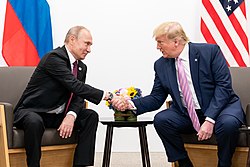This article needs to be updated.(July 2022) |
| Trump–Russia relations |
|---|
 |
This is a timeline of events from 2020 to 2022 related to investigations into links between Trump associates and Russian officials relating to the Russian interference in the 2016 United States elections. It follows the timeline of Russian interference in the 2016 United States elections, both before and after July 2016, until November 8, 2016, election day, the transition, the first and second halves of 2017, the first and second halves of 2018, and the first and second halves of 2019.
Contents
- 2019
- 2020
- January
- February
- March
- April
- May
- June
- July
- August
- September
- October
- November
- December
- 2021
- January 2
- February 2
- March 2
- April 2
- May 2
- June 2
- September 2
- 2022
- August 2
- November 2
- See also
- References
- External links
These events are related to, but distinct from, Russian interference in the 2020 United States elections.








